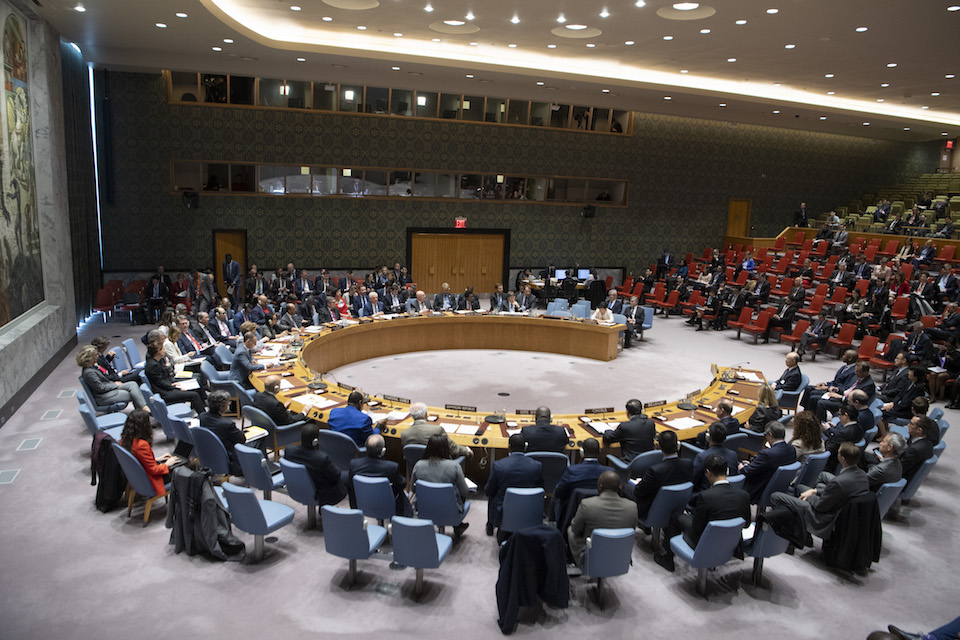Non-proliferation and International Stability
Statement by Ambassador Jonathan Allen, UK Deputy Permanent Representative to UN, at the Security Council Briefing on the Nuclear Non-Proliferation Treaty

Thank you, Mr President.
As we embark on another review cycle for the Non-proliferation treaty, it is important that we as the Security Council, charged with the maintenance of international peace and security, take a step back and consider the contribution made by the NPT to international stability. For the past 50 years, the NPT has minimised the proliferation of nuclear weapons, and provided the framework for significant nuclear disarmament. To take the United Kingdom’s own example, we have more than halved the number of warheads since the height of the Cold War.
Of course, the NPT has not been about prohibition. It has also provided the framework to develop secure, safe, peaceful uses for nuclear energy globally. This ensures the international community can have confidence in the safety of civilian nuclear energy.
But where proliferation does occur, the NPT also provides the framework for this Council’s action to contain it. Under the JCPOA, Iran is subjected to a rigorous programme of inspections made possible by the architecture underpinning the NPT. While this Council continues to demand that North Korea dismantle its nuclear programme, the verification of that will ultimately need to be conducted consistent with the NPT.
As we approach another Review Conference, we should keep in mind that there is more that unites us than our differences, and that we all agree we should strengthen the NPT going forward. The United Kingdom is committed to working with all partners to securing a positive outcome to the Review Conferences. This this means resolving the Chairmanship, as well as agreeing an agenda for the RevCon in 2020, at the Third PrepCom.
Mr President, despite these challenges, it is important that we continue to demonstrate progress on disarmament in a way that strengthens all of our security. This is why the United Kingdom is working on developing disarmament verification solutions, particularly with the United States, Sweden and Norway in the Quad. Establishing an effective verification regime will be vital if we are to realise our long-term goal of multilateral nuclear disarmament. States will need to have confidence that a nuclear-armed state has dismantled its warheads and that, crucially, this is done in a way that makes us safer, rather than spreading nuclear knowledge.
This work has demonstrated that Non-Nuclear Weapon States can play an important role in the development of nuclear disarmament verification while preventing proliferation. We encourage all states to fully participate in this process to continue to grow capacity for verification worldwide – and very much welcome France and Germany’s joint verification exercise scheduled for later this year.
Mr President, we must all continue to promote the step-by-step approach, and work for universalisation of the Non-proliferation treaty; early entry into force of the Comprehensive Test Ban Treaty; and promote the early commencement and conclusions of negotiations on a Fissile Material Cut-Off Treaty in the Conference on Disarmament.
Let me set out some of the steps the United Kingdom is taking to help support a successful Review Conference outcome:
We will be submitting a draft Implementation Report to the PrepCom, setting out how we have implemented the NPT this review cycle, and we encourage all states to do the same.
We intend to use our coordinator role of the P5 process to continue the excellent work that has taken place under Chinese leadership, including continuing the P5’s dialogue with all signatories.
We will remain a strong supporter of the IAEA and all the work it does, including efforts related to Technical Cooperation. The UK has made significant extra-budgetary contributions to support the refurbishment of the Seibersdorf laboratories (including just over 1 million euros between 2016 and 2018)
We are pleased to have signed a new Voluntary Offer Agreement and Additional Protocol with the IAEA in June 2018 and the Nuclear Safeguards Act 2018 which enables the UK to establish a domestic nuclear safeguards regime.
We continue to regard the Additional Protocol as the gold standard of safeguards and urge those states who are yet to have done so to agree and ratify these agreements with the IAEA. We strongly support the State Level Concept.
Mr President, I would also note the echoing silence on compliance issues from some of the states which are most eager to promote the Nuclear Weapon Ban Treaty, a treaty that lacks any concrete provisions for verifying compliance. The UK will not support, sign or ratify this treaty.
Mr President, We should not underestimate the challenges facing the Non-proliferation treaty – themselves an indication of the challenges facing international security. Any meaningful discussion on disarmament must take into account the wider security environment. We all have a responsibility to work towards a safer, more stable world, in which those states with nuclear weapons feel able to relinquish them, and this is where the United Nations Security Council must make its own contribution to the NPT. That must involve remaining resolute in our determination to fully disarm North Korea, and to prevent the escalation of conflicts. And we must give our full political support to the continuation of the NPT process and an agreed, consensus-based outcome to the upcoming review conference.
Thank you Mr President.